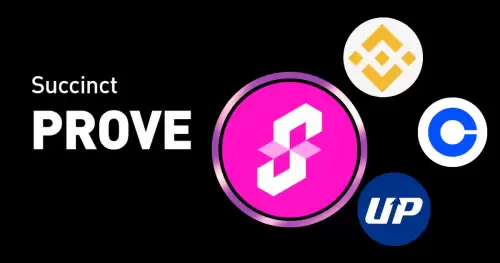 |
|
 |
|
 |
|
 |
|
 |
|
 |
|
 |
|
 |
|
 |
|
 |
|
 |
|
 |
|
 |
|
 |
|
 |
|
Nachrichtenartikel zu Kryptowährungen
Die große Kontroverse der Sui -Governance
May 24, 2025 at 01:00 pm
Die Ankündigung von Cetus Protocol auf X, dass „ein Angreifer ungefähr 223 Mio. USD gestohlen hat“ aus seinen Liquiditätskrypto -Pools

Cetus Protocol's announcement on X that “an attacker has stolen approximately $223M” from its liquidity crypto pools set off the loudest governance controversy in Sui's short history. The team wrote that it had “took immediate action to lock our contract preventing further theft of funds,” adding a reassurance that “$162M of the compromised funds have been successfully paused. … We are working with the Sui Foundation and other ecosystem members right now on next-step solutions” and promising “a full incident report.”
Die Ankündigung von Cetus Protocol auf X, dass „ein Angreifer ungefähr 223 Mio. USD gestohlen hat“ aus seinen Liquiditätskrypto -Pools, die die lauteste Governance -Kontroverse in der kurzen Geschichte von Suis ausgelöst hat. Das Team schrieb, dass es „sofortige Maßnahmen ergriffen hatte, um unseren Vertrag zu sperren, um weitere Diebstahl von Geldern zu verhindern“, was die Gewissheit hinzugefügt hatte, dass „162 Mio. USD der kompromittierten Mittel erfolgreich inneiert wurden.… Wir arbeiten gerade mit dem SUI Foundation und anderen Ökosystemmitgliedern zusammen mit den nächsten Schritt-Lösungen zusammen und versprechen„ einen vollständigen Auffallbericht “.
Those next-step solutions triggered a philosophical firefight. To keep the stolen assets marooned on-chain, a super-majority of validators agreed to ignore outgoing transactions from three hacker-controlled addresses. Cyber Capital founder Justin Bons argued that the very act of blacklisting demonstrates structural centralization: “SUI’s validators are colluding to CENSOR the hacker’s TXs right now! … Does that make SUI centralized? The short answer is YES; what matters more is why?” Citing only 114 validators and founder–heavy staking, he declared: “The ‘founders’ own the majority of supply & there are only 114 validators!”
Diese Lösungen für nächste Schritt lösten ein philosophisches Feuergefecht aus. Um die gestohlenen Vermögenswerte auf Kette maroon zu halten, erklärte sich eine Supermacht der Validatoren bereit, ausgehende Transaktionen von drei von Hacker kontrollierten Adressen zu ignorieren. Der Gründer von Cyber Capital, Justin Bons, argumentierte, dass der Akt der Blacklisting die Strukturzentralisierung demonstriert: „Die Validatoren von Suis, um die TXS des Hackers im Moment zu zensieren, macht Sui zentralisiert? Zitierte er nur 114 Validatoren und Gründer - heftiges Stakeln und erklärte: "Die" Gründer "besitzen den größten Teil des Angebots und es gibt nur 114 Validatoren!"
Amogh Gupta from the SUI Foundation countered that the move was a legitimate exercise of distributed governance. “Just because validators reach consensus about something, doesn't mean they're 'colluding'. […] Validators on other chains can (and have) done the same. You can view it like OFAC. apexminds claims to be able to disable ALL outgoing transactions from the hacker's address. This is false. It is possible to disable transactions to another chain, e.g. the hacker moved some funds to ETH. We could choose to ignore those transactions, rendering them effectively unspendable. But we haven't done so yet. We are currently discussing what, if any, further action to take. apexminds claims that this is impossible because there is no "switch" that disables transactions. This is correct. It would work like ignoring transactions to a specific token, e.g. imagine a scenario where a specific token is being used maliciously and broadly in an attempt to drain liquidity from multiple protocols. In such a scenario, perhaps validators might choose to collectively ignore that token type. It is not about brute force but rather about making targeted economic decisions. It is an extreme measure that would be used in a truly urgent instance with broad agreement among validators. It is not something that a single entity could do unilaterally. It is also not something that is done lightly. It is a capability that could be used for good or bad, and there is an opportunity for discussion and debate among validators and the community at large to decide how, if at all, it should be used. It is a collective decision-making process, not a hierarchical one. It is also not something that is unique to Sui. OFAC sanctions are a capability that exists on Ethereum to prevent sanctioned parties from engaging in economic activity on-chain. This capability was used earlier in 2023 to great effect to largely shut down North Korean cybercriminal activity on Ethereum. The point is that this capability is not specific to Sui. The OFAC/sanctioned transactions were a grey area that some viewed as economically and geopolitically motivated. A hack is clear as day bad, so there is no contention about it being good or bad.
Amogh Gupta von der Sui Foundation konterte, dass der Umzug eine legitime Ausübung verteilter Governance sei. „Nur weil Validatoren einen Konsens über etwas erreichen, heißt das nicht, dass sie" zusammenbrechen ". […] Validatoren auf anderen Ketten können (und haben) das Gleiche erledigen. Effektiv unauffällig. Vielleicht ignorieren Validatoren, dass es sich um einen Token -Typ handelt. Wie sollte es ein kollektiver Entscheidungsprozess verwendet werden, wenn es darum geht, nicht zu verhindern, Sui.
Bons rejected the analogy. “You are misinformed about the 2023 OFAC regulations: Not a single ETH TX was censored, as collusion was impossible on a chain with low Network Concentration and a large number of independent validators. That SUI’s distribution of power is so concentrated that this is even possible in the first place is the problem. We are talking about a single entity (or small group) having enough power to shut down all TXs to another chain (which would be a major event), not something that can be done quickly or easily. It is also not something that is done lightly. It is an extreme measure that would be used in a truly urgent instance with broad agreement among validators and the community at large. It is not something that a single entity could do unilaterally. It is also not something that is done without discussion and debate. It is a collective decision-making process, not a hierarchical one. It is also not something that is unique to Sui. OFAC sanctions are a capability that exists on Ethereum to prevent sanctioned parties from engaging in economic activity on-chain. This capability was used earlier in 2023 to largely shut down North Korean cybercriminal activity on Ethereum. The point is that this capability is not specific to Sui. The OFAC/sanctioned transactions were a grey area that some viewed as economically and geopolitically motivated. A hack is clear as day bad, so there is no contention about it being good or bad.”
Bons lehnte die Analogie ab. „Sie werden über die 2023 OFAC -Vorschriften falsch informiert: Kein einziger Eth TX wurde zensiert, da die Absprache in einer Kette mit niedriger Netzwerkkonzentration und einer großen Anzahl unabhängiger Validatoren unmöglich war. Die Verteilung der Macht durch Suis ist so konzentriert, dass dies sogar möglich ist. oder ist es auch nicht, dass es eine extreme Maßnahme ist, die in einem wirklich dringenden Fall mit breitem Übereinstimmung und der Gemeinschaft einseitig einseitig sein kann, was auch nicht zu diskutieren ist. Zu verhindern, dass sanktionierte Parteien in der Kette der Wirtschaftsaktivität eingesetzt werden.
Gupta: “This is a common misperception. The founders' tokens are locked up for a multi-year schedule
Gupta: „Dies ist eine häufige Fehlwahrnehmung. Die Token der Gründer sind für einen mehrjährigen Zeitplan eingesperrt
Haftungsausschluss:info@kdj.com
Die bereitgestellten Informationen stellen keine Handelsberatung dar. kdj.com übernimmt keine Verantwortung für Investitionen, die auf der Grundlage der in diesem Artikel bereitgestellten Informationen getätigt werden. Kryptowährungen sind sehr volatil und es wird dringend empfohlen, nach gründlicher Recherche mit Vorsicht zu investieren!
Wenn Sie glauben, dass der auf dieser Website verwendete Inhalt Ihr Urheberrecht verletzt, kontaktieren Sie uns bitte umgehend (info@kdj.com) und wir werden ihn umgehend löschen.
-

- Bonk, Pengu und kalte Brieftasche: Was ist heiß und was ist momentan nicht in Krypto
- Aug 07, 2025 at 12:00 am
- Navigation durch die Meme -Münzmanie und das Finden von echtem Nutzen. Ein Blick auf die Volatilität von Bonk, das Austauschdebüt von Pengu und das einzigartige Cashback -System von Cold Wallet.
-

-

- Solana -Preis und der Anstieg der Übermittlung: Revolutionierung von Kryptozahlungen
- Aug 07, 2025 at 12:00 am
- Solanas Preis sieht sich der Volatilität gegenüber, aber Remittix (RTX) tritt als vielversprechende Lösung für Kryptozahlungen in realer Welt auf und bietet einen Einblick in die Zukunft von Payfi.
-

-

-

-

-

- Blockdag, Krypto und Binance Coin: Die heißesten Trends, die Sie nicht ignorieren können
- Aug 06, 2025 at 10:00 pm
- Tauchen Sie in die Welt der Blockdag-, Binance -Münz- und Krypto -Trends ein. Entdecken Sie wichtige Erkenntnisse, Market -Buzz und potenzielle ROI -Chancen. Verpassen Sie nicht die nächste große Welle!
-




























































